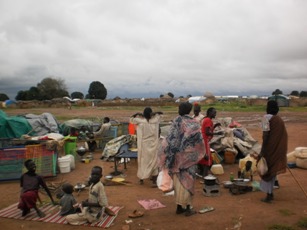IOM returns over 2,000 southerners, lauds citizenship deal
By Julius N. Uma
March 20, 2012 (JUBA) – The International Organization for Migration (IOM) has lauded the recently concluded framework agreement between Sudan and South Sudan, which defines movement, residence, economic activity and properties of citizens living in either country.

South Sudan seceded in July last as part of a 2005 peace agreement. The citizenship agreement has been one of the few breakthroughs in post-independence negotiations between the two countries.
The IOM said in a statement that it “welcomes the conclusion of the framework agreement, and stands ready to provide whatever support is deemed necessary by both governments, in close coordination with the African Union High-Level Implementation Panel.”
It further pledged its commitment to work with both governments to ensure return operations are conducted in a safe and dignified manner, while taking into account the rights of migrants on both sides of the border.
NEW RETURNEES
The IOM also announced the safe arrival of 2,300 South Sudanese returnees, who left Sudan capital, Khartoum by train 18 days ago and arrived on 18 March in Wau, the Western Bahr el Ghazal State capital.
According to IOM, the train left Khartoum with 982 returnees, who were later joined by another 546 in Kosti, the main way station for South Sudanese returning home while an estimated 700 more people boarded the train before it crossed the border into South Sudan at Rumaker.
Their movement by train was organised in close cooperation with Sudan’s Internally Displaced People’s (IDPs) center, the Commission for Voluntary and Humanitarian Works (CVHW), South Sudan Relief and Rehabilitation Commission (SSRRC), United Nations Refugee Agency (UNHCR) and UN Children’s Fund (UNICEF), with funding from the UN Central Emergency Response Fund (CERF).
While en route, IOM says it provided returnees with food, water, and medical attention and on arrival in Wau, tokens were distributed to boost registration process among them.
The train, according to the organisation, was the first to leave Khartoum since the two governments signed a memorandum of understanding in early February, which outlined a voluntary, safe and dignified return process for South Sudanese in Sudan wishing to return to their newly-independent homeland.
South Sudan’s government, last week, approved SSP 50 million ($16.6 million) meant to expedite the repatriation process for South Sudanese stranded in Sudan. The funds will be managed by South Sudan Relief and Rehabilitation Commssion (SSRRC).
The IOM operates a national tracking and monitoring database across South Sudan, employing over 500 government enumerators tasked to register and track returnees as well as primary and secondary displacement of IDPs.
Since the north-south civil war ended in 2005 the organisation says it has tracked over 2.5 million returnees to South Sudan.
In 2011 alone, IOM registered over 360,000 returnees, the majority of whom reportedly face various reintegration challenges. Specifically cited was the slow allocation of land by the government, said to have been complicated by the lack of basic transport, education, and health infrastructure in rural areas.
(ST)
